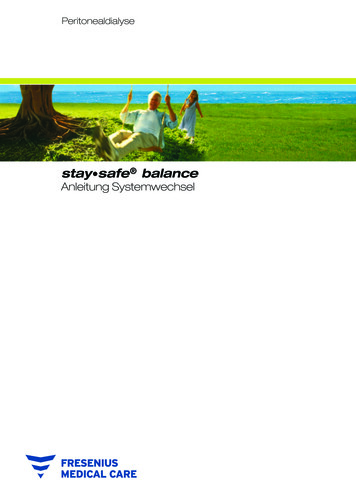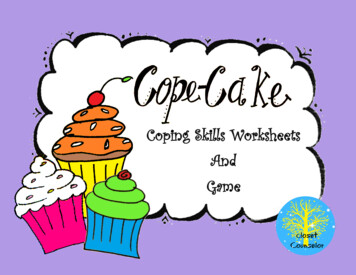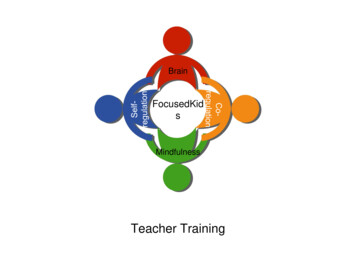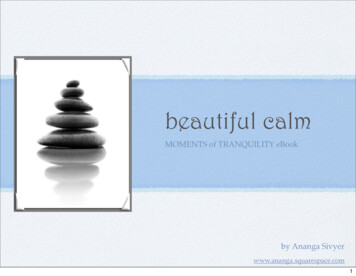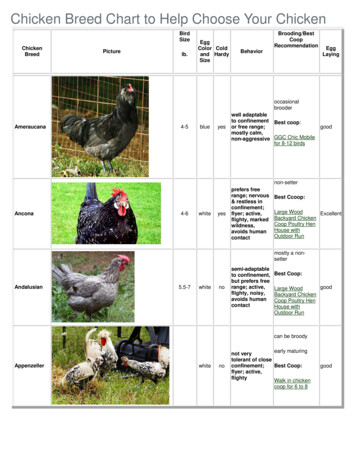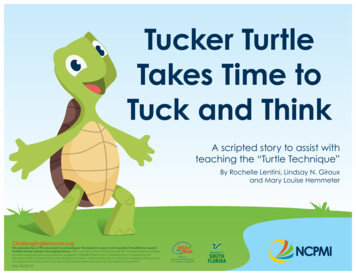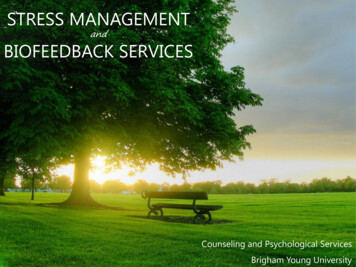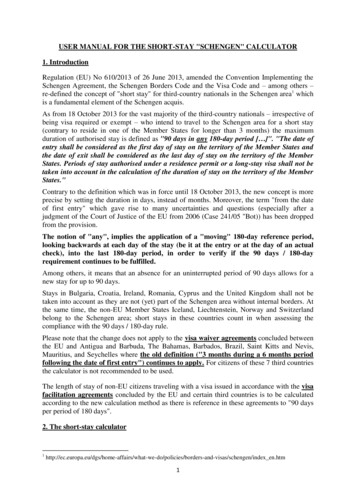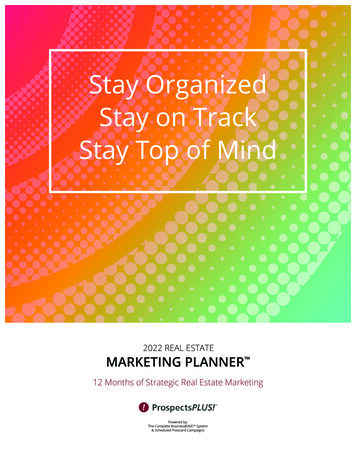
Transcription
HOW TO STAY CALM INA GLOBAL PANDEMICBY DR EMMA HEPBURNCopyright 2020 Emma Hepburn
CONTENTS Mental health at a time of coronavirus The mental health curve The covid capacity cup The post high-stress slump Why am I finding this so difficult? Just some emotions you might feel during coronavirus Routes off the anxiety roundabout Corona icebergs Beware pandemic pressure Self-compassion at a time of coronavirus
MENTAL HEALTH AT A TIME OF CORONAVIRUSNational data indicates that the current global pandemic is resulting in increasedanxiety and reduced wellbeing for many of us. Probably no surprise there. Overthe past few weeks, I’ve taken part in lots of interviews and been asked the samequestion a number of times: ‘How can Covid-19 impact on our mental health?’ SoI thought I’d answer this in the drawing here.Although I haven’t included it in the illustration, I wanted to acknowledge too thatsome people (albeit a minority) have recognized that the current situation hasimpacted positively on their mental health. They have mentioned that reducedchoice has allowed for more focus on what matters to them, slowing down andappreciating what they have.
THE MENTAL HEALTH CURVEIn the UK we are experiencing a second wave of Covid-19 with an exhaustedpopulation whose resources are depleted. The gung-ho togetherness and sunnyspringtime weather have gone and Covid fatigue is drawing in with the waninglight. We all move up and down the mental health curve in our everyday lives, butresearch suggests Covid may be pushing more of us down the curve. So, hereare 15 ideas for how to continue to look after your mental health during a winterlockdown, when you are already feeling drained and run-down.1. Understand this is not you, or a failure in you. How you are feeling is a productof months of living with high stress, uncertainty and anxiety, along with theinability to use our normal coping strategies. The depletion and exhaustion are aresult of our body having its foot on the gas pedal for too long, which leaves usfeeling as if we are running on empty.
2. Hold onto your buoys – the things that keep you afloat when waters arechoppy. What gentle activities might you have capacity for? Perhaps makebreakfast the night before, make sure you drink enough fluid, let in some daylightor go to bed early. These things don’t use up many resources, but not doingthem can make you sink far faster when you are feeling bad already.3. If your normal coping strategies seem too much effort, try to think of asmaller way that you could apply these so they still have some effect. Can’t facezooming? Can you text instead? Can’t face the gym? Go outside for a walk for afew minutes. Seeing coping strategies as all or nothing can lead you to abandonthem, but finding gentle alternatives provides some of the positive impact, whichis far better than none at all.4. Be extra gentle on yourself when we are tired we have less cognitive resources.More things may go wrong, we can do less and we may not function how weexpect. This is lighter fuel for your inner critic and your brain can fall into wellworn paths of self-criticism. This is a signal to hold on to self-compassion andnot let go, but you may not have the resources to do this. Find ways to remindyourself of your compassionate voice that requires less effort, such as prompts orsaved kind messages.5. Our brain predicts how we will feel based on how we feel now. Feeling rubbishmeans your forecasting is likely to be off and you are more likely to predictyou will not enjoy activities. Plan things based on the knowledge that you haveenjoyed them previously. This is a better indicator of whether you will enjoysomething again than your current mood. A walk outside may feel unappealing,but test it out – go outside for five minutes and see what it actually feels like. If itfeels good, keep going, if not, come home and snuggle up.6. Don’t shame yourself for feeling ****. Shaming ourselves for our emotions canlead us to suppress them, which ironically leads to greater stress. You feel badbecause it is difficult and you are allowed to feel this way. It seems like you willalways feel this way, because it’s hard to predict feeling any other way when youfeel bad. But no emotion can last forever and our psychological immune systemworks in much the same way as our physical immune system . . . you will not feellike this always and you will feel differently again.7. Our brain is drawn towards the negative at the best of times. When feeling badwe are even more likely to focus on things consistent with our mood, amplifyingthe negative. Try to consciously draw your attention towards things that make youfeel good – help your brain notice the good stuff. This can be effortful when youfeel depleted, but the initial effort can be worth the longer-term return on howyou feel.
8. Remember that none of us can always function alone. We all need extra inputat times. Seeking and accepting help is not a failure, it’s a basic human need anda form of active coping to help keep us afloat.9. Plan daily pockets of joy and relaxation. Creating positive affect is imperativeright now. Try to plan things to look forward to across the next week and month,so that your brain has something positive to anticipate.10. Prioritize activities that give you meaning and purpose, as these are inherentlygood for wellbeing.
11. Create comforting rituals – these can be things you do on a daily or weeklybasis. Or create some meaningful new family/friend/workplace rituals to lookforward to.12. Make active decisions about what you let into your limited brain space. Don’tallow news, social media and negative information to take up too much of yourresources. Decide what it is most helpful for you to focus on right now.13. Our brains like certainty but think about whether the places you look forcertainty are actually creating more uncertainty or making you feel anxious. Wecheck the news, social media or talk about the current situation in an attempt tocreate certainty, but often these things can actually make us feel worse and moreuncertain.14. Watch out for the myths and societal messages around productivity. We arenaturally inclined to want to achieve and society bolsters this belief by rewardingachievements. Then when our productivity drops because we are depleted, wecan no longer meet the standards we have set, which means we feel like we arefailing. Try to set realistic expectations based on how you are feeling now, notwhat you are usually like. Allow yourself to slow down, lower the bar and do less,if possible.15. Reframe the meaning of taking a break and allow yourself to enjoy it. This isessential for your body, brain and wellbeing. Sitting on the sofa watching Netflixfor a whole day doesn’t make you lazy – if you enjoy it (which you are more likelyto if you allow yourself to), it is an activity that helps restore your resources andrest your brain and body. And that’s more necessary then ever right now.
THE COVID CAPACITY CUPWhy do I feel so stressed and exhausted? Imagine a dystopian world where wehave to be hyper vigilant at all times because of a great level of general threatand risk. Where at short notice, our world and lives have to be unpredictablyoverhauled to manage that risk. Where uncertainty about what might happennext becomes the norm.Of course, we don’t have to imagine this . . . we just need to remember thelast few months and think about what’s happening now. We’ve been running athigher than normal general threat levels for a long time now. Our capacity hasbeen running at full with all the uncertainty, unpredictability, change and stressorswe’ve been dealing with. And that’s on top of normal life, which often fills ourcapacity to the brim anyway.This means that our brains have been perpetually telling our body to directenergy to deal with that threat. We are exhausted because our body has beenin a state of high stress. And ironically that exhaustion itself uses up even morecapacity: mustering up the required energy to manage through this becomes
all the harder and life seems more difficult as our capacity cup feels at risk ofbubbling over.And, of course, once you’re near the top it doesn’t take much to make yourcup spill over. We can have big reactions to seemingly small things, feeloverwhelmed, irritable and completely exhausted. Sometimes it feels as if thishappens with no apparent cause because it might have been a tiny thing thatused our last sliver of capacity.I’ve spoken to lots of people over the last few weeks and the collective feeling, asthe Covid-19 pandemic continues, is that our capacity cups are fuller and we aremuch closer to our cups spilling over. These are just some of the reasons you toldme about:The cup here is pretty full and I’ve tried to capture them here by theme. Thethings in your cup are using up your emotional capacity . . . and we all havelimited capacity.It can help to really notice what’s in your cup and find ways to manage yourcapacity to stop it spilling over, if you can. Some key ways to manage capacityare: recognize the signs when you are reaching full capacity and break things downso that you can work out what you can tackle. don’t forget to use your coping strategies. seek support when you can. kick unnecessary things out of your cup, if possible. talk things through with a friend. prioritize breaks and rest and recovery periods (even just short ones). be kind to yourself and don’t beat yourself up for feeling bad or finding thingsdifficult. look after the basics . . . eat and drink regularly, prioritize sleep and exercise.
THE POST HIGH-STRESS SLUMPIt might be worth thinking about how your body’s stress reaction affects you andwhy, as things settle slightly and stress reduces, you can experience a slump.Your body’s stress response is there for a purpose . . . to get your body ready todeal with the stressor, whatever that might be. It does this by releasing glucoseinto your bloodstream and directing the energy to those places that need it.This is why stress and anxiety are exhausting, because they use your energy. Ifit’s short term, you will feel exhausted once the immediate stress has passed butrecover quickly as your body has plenty of reserves left.
But, if the stressors have been around for a while, your body has had to keep itsfoot on the gas pedal to supply you with the energy you need. This keeps yougoing and you may not notice that your body is depleted, as the stress responsekeeps you on high alert. Ironically though, this can also disrupt the body’s meansto replenish – long-term stress can disrupt sleep, interrupt your diet and impactyour immune system.And when the long-term stressor has passed, it doesn’t just take one night’s sleepor a couple of days for your body to recover – you might need quite some timefor your brain to even realize the stress has passed. Your body and brain needto physically recover because they’ve been functioning at such a high level ofenergy consumption for a long time. And as the body’s stress response drops, it’sonly then you realize quite how exhausted you are.So go easy on yourself. If you don’t achieve as much as you hoped, or you needto rest more or take things slow, it doesn’t mean you are lazy – it just means yourbody and brain are telling you to take some time to let them recover. Beatingyourself up creates more stress and depletes your body more. Try to allowyourself and your body to recover as best you can.
WHY AM I FINDING THIS SO DIFFICULT?Uncertainty is difficult. Our brains find uncertainty difficult. Normally we managethis by creating plans and anticipating the future with a degree of confidenceand assumed accuracy, but that’s just not possible right now. Our brains feelstressed because uncertainty and unpredictability is ever present and the future isunknown.Then on the flip side, our normal coping strategies, which help us deal withstress, are just not available. A relaxing pub visit is an oxymoron right now. Aleisurely browse is fraught with tension. Meeting friends has such a degree ofadded complexity or planning that it’s not quite the easy, fun event it shouldbe. Anticipated joy to fill our mind is hard to find, so anticipated dread creepsin instead. As for holidays – the thought of which often keep us going throughtough times – well, who knows when they will be back.
It’s a double-difficult whammy of increased stress and less availability of copingstrategies to deal with that stress. And that is not just double difficult, butexponentially difficult. Often we blame ourselves for how we feel. We think weshould be feeling differently or doing better. But sometimes we just find it difficultbecause it is difficult. So, try not to shame the feelings you are having rightnow, or internalize these to mean something negative about you. Difficult timescan result in difficult emotions. That doesn’t feel nice, but shaming or blamingyourself just makes it even harder.Instead, try to recognize and validate how you feel. Everybody’s brain is differentas are everybody’s situation and experiences. Combine these together and itmeans that how everybody will feel in response to the current situation will beslightly different. Different doesn’t mean wrong, differences are the norm withemotions because they are the norm with humans. And difficult emotions are thenorm in difficult times, but these need extra care not the additive stress of shameor blame.JUST SOME EMOTIONS YOU MIGHT FEEL DURINGCORONAVIRUSIf only we could fit emotions into discrete little boxes, label them concisely andfile them away by category, closing the lid when we don’t want them to happen.But this is not how our emotions operate or how we function. Emotions are anintegral part of our brain, body and world. We can’t always decide what we want
to feel and when. And our emotions don’t arrive neatly packaged, one by one, onthe conveyor belt that is our lives.Our emotions can be mixed, contradictory and jumbled. Lots can come at once,bursting out of that box on the conveyor belt. If only it were always as simple assaying ‘this happened and therefore I feel this’. Sometimes that is the case. Butso many different things affect how we feel that sometimes the emotional jumblecan be confusing and difficult to work out.Whether you can package up your emotions around the current situation intocategorical easy-to-understand boxes or your boxes are a jumbled mix ofemotions, neither is wrong. Emotions come in a whole range of pick-and-mixcolours and feelings are a resulting combination of your individual experiences,thoughts and beliefs, your brain and body functioning and your environment.Whatever your emotional pick-and-mix looks like, it’s not wrong to feel a rangeof mixed, changeable, overlapping and sometimes contradictory emotions.Emotions can combine in colourful, confusing and sometimes conflicting ways.ROUTES OFF THE ANXIETY ROUNDABOUTIf we had a graph of anxiety levels at the current time I suspect it would closelyfollow coronavirus rate graphs – on the rise as cases rise. That’s why it’s moreimportant than ever for everyone to find ways off the anxiety roundabout.When you’re on the anxiety roundabout your body’s sympathetic nervous systemescalates – adrenaline and cortisol are released to get your body ready to run,hide or fight. This sets off a huge range of physiological sensations – tightenedmuscles, rapid breathing, shaky extremities, sweaty skin, redness rising, stomachemptying, bowels constricting, burning energy, blood flowing to your limbs. Itdoesn’t feel nice, but it’s just physiology . . . it’s your body using too much energyand directing this energy in a possibly misguided attempt to be helpful.What you do at this point can push you further round the anxiety roundaboutor it can help you to find a route off. To get off the anxiety roundabout youneed to find ways to de-escalate the sympathetic system and try to engage theparasympathetic system instead, which helps you rest and digest, and calm thingsdown.It’s about doing something that changes your physiology . . . exercise is greatfor this as it uses up extra energy and automatically triggers different chemicalsthat help calm your body down. But there are lots of different ways to do this –usually these involve a change in what you are doing, shifting your attention ordoing something to calm your body. What works for you will be unique to you.
These are anxious times: we can’t stop being anxious (it’s human) and we need torecognize how we are feeling (and not shame ourselves for this).These are the ways you told me you got off the anxiety roundabout and someof the most common methods people use to de-escalate their sympatheticnervous systems and ramp up their parasympathetic system to help change thephysiological reactions that are creating anxiety. I hope some of these help you.
CORONA ICEBERGSThe icebergs are back! But this time it’s the Corona icebergs.We all make comparisons and it can seem we are doing so much worse thanthose around us. But the reality is we often just don’t know what’s going onunderneath the surface and because of this, we compare our whole iceberg tosomeone else’s iceberg tip, what’s showing above the surface. And that’s just nota valid comparison.Not only do we make judgments about ourselves based on these comparisons,but we can make invalid judgments about others too. The person who rudelypassed you without saying ‘Hi’ might be too worried about their financial situationto have the brain space to notice what’s going on around them. The friend whokeeps turning down zoom invitations might be feeling so overwhelmed by lifethat speaking to others seems like one step too far. The work colleague who isn’tpulling their weight may be so anxious about the potential impact of Covid ontheir family members that they have to reduce their work duties.So crush that self-comparison by recognizing you only have part of the pictureand widen your compassion by also realizing you only have part of the picture.Because the tip of the iceberg rarely tells the whole story.
BEWARE PANDEMIC PRESSUREThe World Health Organization tells us that not only are we dealing with apandemic but we are also experiencing an infodemic alongside this. There is somuch information out there – some good, some false. Even the good stuff canfeel bamboozling as there’s just so much of it.Advice on how to manage and cope can, in itself, become overwhelming. Whilefollowing the government guidance for COVID-19 is, of course, imperative, whenit comes to coping and your mental health, there is NO one correct way to getthrough this. We all manage and cope in different ways. The priority is lookingafter yourself, and your loved ones when possible, to help you feel as safe and ascomfortable as you can, enabling you to adjust to a different normal. No adviceon how to manage can be universally applied and you are not getting it wrong ifthis doesn’t work for you.
WHAT YOU NEED TO DO IN A GLOBAL PANDEMICThere are many social media posts and articles at the moment suggestingwe should be using this time to help others, develop new skills, increase ourknowledge and get fit. And there are no shortage of pictures on social media ofsourdough starters, fermented food and creative exploits. For some people theseactivities may be the thing to help them cope and get through this time, andthat’s great if it is. However, watch out for pandemic pressure – when this type ofinformation leads to comparison and increasing pressure. As @mumologist puts it‘my lockdown is better than your lockdown’ or perhaps more likely, you’re makingthe comparison that someone else’s lockdown is better than yours.If you find yourself feeling stressed or overwhelmed about what you SHOULD bedoing right now, remind yourself that there is no one right way to get throughthis time. Take the pandemic pressure off. It is okay to allow yourself time tomuddle through and manage as best you can, whatever that looks like. We don’thave to emerge at the end of the pandemic as a highly skilled baker with a JoeWicks body. But we do have to ensure we come through this time looking afterourselves the best we can and feeling as safe and as good as we possibly can, sothat we can get to the other side as mentally healthy as possible.
SELF-COMPASSION AT A TIME OF CORONAVIRUSComing soon to an Instagram post near you . . . compassion at a time ofcoronavirus. Set in a dystopian present, featuring your inner critics andstarring our superhero, Brian the Brain, fighting against the critics withboth compassion and common sense.At times of high anxiety, like now, feeling stressed or distressed is a normalreaction to an abnormal situation. But watch out, because overwhelm andstress are perfect fodder for your inner critic and it likes to insidiously creepin to berate you unfairly when it spots your brain is otherwise occupied.Your inner critic is a threat that triggers your flight, fight and freezeresponse. Time to oust that inner critic and see it for what it is: a subjectiveprophet of doom, that feeds on uncertainty and self-doubt and trades inlies, distortions and bending the truth.
Once you’ve ousted your critic, it’s time to fight back with some compassion,using the objectivity we tend to apply to others. We tend to judge ourselvesharshly because our view of ourselves is inextricably tied in with our emotions andthe stories we hold in our brains about who we are. The subjective nature of yourbiased brain and beliefs tint how you view your world.Give yourself the benefit of the objectivity that you tend to give to others. Stepback and think. If someone else were in this situation, what would you think aboutit and what would you say to them? Your levels of objectivity and fairness whenviewing another’s situation are often much higher than when you view your own.If you find this is the case, then apply this fairer voice to yourself. Because it isonly fair that you have the same level of compassion applied to yourself as youwould apply to other people. Compassion calms, soothes and helps you solvethe situation.
ABOUT THE AUTHORDr Emma Hepburn is a clinical psychologist, with expertise inneuropsychology, who has over 15 years’ experience of working with andtreating mental health difficulties in both the public and private sector. Sheis passionate about bringing psychology and evidence-based mental healthinformation beyond the clinic room to a wider audience and encouragingpeople to proactively look after their mental health. Her illustrative workhas been used by a number of organisations including The AmericanAssociation for the Prevention of Suicide, The Royal Society of PublicHealth and the Samaritans (India). She writes as @thepsychologymum onInstagram and has recently won a Bronze Lovie (Best of European Internet)award, as well as a Peoples’ Choice Lovie, for her social media work, andhas been shortlisted for the mind Media Awards.
TOP UP YOUR MENTALHEALTH TOOLKITBUY YOURS NOW FROMAmazon Waterstones Bookshop
11. Create comforting rituals - these can be things you do on a daily or weekly basis. Or create some meaningful new family/friend/workplace rituals to look
![IEEE 802 CALM Tutorial Part 3 v2.ppt [Read-Only]](/img/17/ieee-20802-20calm-20tutorial-20part-203-v2.jpg)

